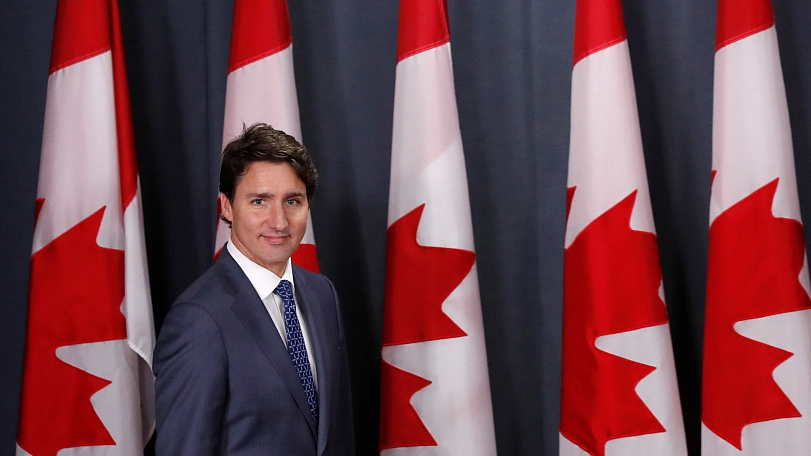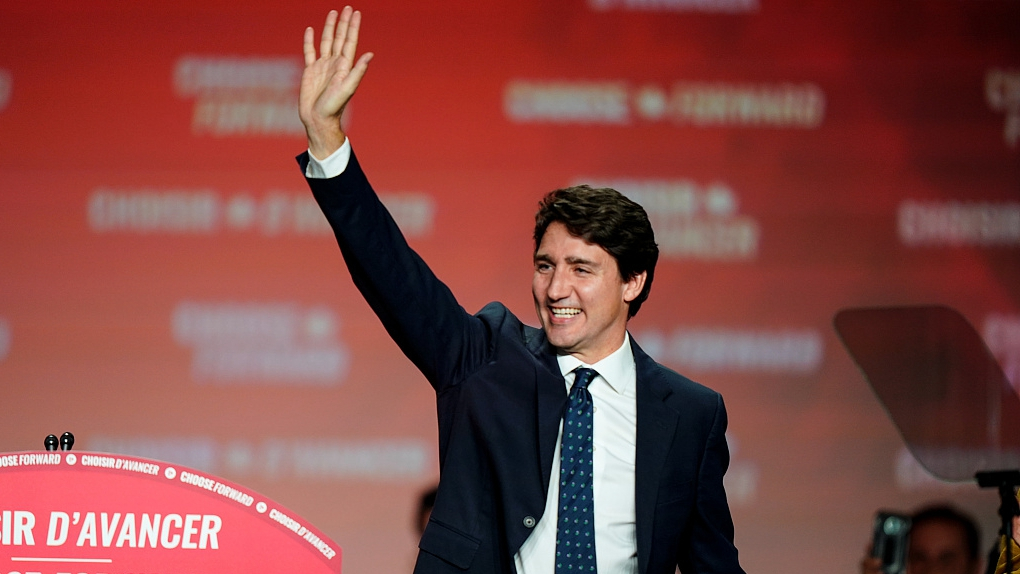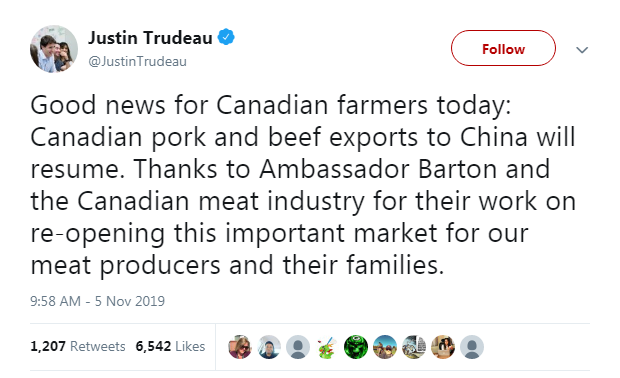
It's been weeks since Canada's federal election. And the aftermath continues as the winner, incumbent Prime Minister Justin Trudeau's Liberal Party, has not yet delivered any policy address and will not release the new cabinet until November 20.
Trudeau's first term was mired in political scandals and diplomatic uproars. After being accused of political meddling in the criminal prosecution against engineering giant SNC-Lavalin, he was then involved in an ethical lapse after his image of blackface emerged.
Regarding foreign relations, Trudeau has been criticized by oppositions for "being an amateur" as they claimed that Canada's relations with the U.S., India, and China have been weakened under his mandate.
Given his political fumbles and a loss of a majority government, Trudeau's policy agenda in his second term would be essential. And among all areas, his policy towards China will draw broad concerns as many wonder if Trudeau, with his minority government, would change his tune.
Ken Moak, co-author of the 2015 book "China's Economic Rise and Its Global Impact," holds an optimistic view on China-Canada post-election relations given China's importance to the Canadian economy and the nation's development, but suggested that bilateral relations face obstacles and require efforts from Trudeau's government to overcome.

Liberal leader and Canadian Prime Minister Justin Trudeau waves to supporters after the federal election at the Palais des Congres in Montreal, Quebec, Canada, October 22, 2019. /VCG Photo
Liberal leader and Canadian Prime Minister Justin Trudeau waves to supporters after the federal election at the Palais des Congres in Montreal, Quebec, Canada, October 22, 2019. /VCG Photo
A non-derailed relationship
Ottawa's relations with Beijing sunk to a new low in December, when China's telecom giant Huawei's CFO, also the daughter of its founder, Meng Wanzhou was arrested by Canada for "fraud in a scheme to violate American trade sanctions against Iran" at the request of the United States.
Despite that, Moak suggested that China-Canada relations "is not derailed" because the arrest of Ms. Meng was more of an "irritant" requiring both sides to take actions to "placate their domestic audiences." In his opinion, the extent of damage is controllable and Canada wants to put the relationship back on track.
Politically, Canadian leaders share a relatively consistent view on China which can be traced back to Trudeau's father Pierre Eliot Trudeau who established diplomatic ties with the People's Republic of China in defiance of the U.S. in 1970.
Knowing that it is impossible to contain China's rise due to its huge influence in the international community, Moak believes that Canadian leaders want to upgrade bilateral ties to a higher level and cooperate with China on major global issues such as climate change and geopolitical conflicts since the two countries are both advocates for globalization.
Economic data provide a more convincing answer. A report from Chinese Ministry of Commerce shows that as Canada's second biggest trading partner, China's trade volume with Canada in 2018 reached 79.5 billion U.S. dollars with an annual growth rate of 8.9 percent.
A recent Huffington Post report further proved the necessity of Chinese investment given that Canada's investment has fallen by 25 percent due to the pulling out of other major investors in Alberta's oil sands.
Moak suggested that the huge market and expanding cooperation would sustain Canada's long-term economic growth and bring opportunities for Canada's national development. Therefore, maintaining close ties with China serves Canada's national interests.

A woman walks past the logo of Chinese telecom giant Huawei during the Web Summit in Lisbon, Portugal, November 6, 2019. /VCG Photo
A woman walks past the logo of Chinese telecom giant Huawei during the Web Summit in Lisbon, Portugal, November 6, 2019. /VCG Photo
Now that Trudeau has managed to retain power, will Canada change its attitude on China? And what would Canada's next move post-election be?
Moak remains optimistic about the future, saying it would not be a surprise to see improvement as China and Canada have more in common than differences. According to him, signs of Trudeau hoping to put the relationship back on track is already showing.
The newly appointed Canadian ambassador to China Dominic Barton, in Moak's view, signals Ottawa's intention to put the relationship back on track.
Barton, the head of U.S.-based consultancy McKinsey & Company in China, is an expert in business and trade. He is said to have close personal connection with Trudeau and have advised Trudeau on establishing a free trade agreement with China.
The appointment, eight months after the former ambassador John McCallum was relieved of duty, sends "an important message to China about how much Canada values its relationship with China," said Canadian's Foreign Affairs Minister Chrystia Freeland.
Meanwhile, China's new ambassador to Canada Cong Peiwu took office on November 1. He is also expected to work with the Canada side to rebuild the relationship.
The trend became even clearer at the seventh Military World Game after Canada sent a big delegation to attend the sports event held in Wuhan, central China, from October 18 to October 27. "The modest people-to-people exchange," in Moak's view, marks the first step in bridging the diplomatic gap.
Good news on bilateral trade also came out on Tuesday as China agreed to resume imports of Canadian beef and pork products, some four months after the suspension due to "ractopamine residues found in Canada's pork products." It is possible that the two sides may take it as a chance to start improving their relations.

Minority government, not a big issue
Given the fact that Trudeau has lost a majority with 156 seats out of 338 seats in the House of Commons, the Liberals need support from at least one opposition party in the parliament to pass any legislation.
Regarding the potential influence of a minority government on Canada's policy towards China, Moak dismissed the concern by saying that China and Canada share broad potential in trade since all political parties are in favor of diversifying Canada's trade portfolio.
Read more:
Canada federal election: Who's who?
One thing worth mentioning is that the number of Chinese-Canada politicians winning a seat in the 2019 election hit a record high with eight elected. The growing Chinese representation in Canada's parliament perhaps would help Canada reconsider its relations with China.
Moak suggested that cooperation between Liberals and other parties would be on "a case-by-case basis," but since Trudeau's Liberal is merely 13 seats short from a majority, the resistance he may face in policy-making is limited.
Despite good signs in bilateral relations, Moak also warned that reversing the deteriorating relations requires strong political will and a willingness to overcome the internal and external forces, and pressure from the U.S in particular.
In this case, the arrest of Meng seems to be an issue that can't be bypassed – either to extradite Meng upon the U.S.'s request or to release her as demanded by China. Facing the tough either-or question, Trudeau needs to think of national interests and make a decision soon.
(Cover: Canada's Prime Minister Justin Trudeau arrives on stage to speak to the news media for the first time since winning a minority government in the federal election, at the National Press Theatre in Ottawa, Ontario, Canada, October 23, 2019. /VCG Photo)